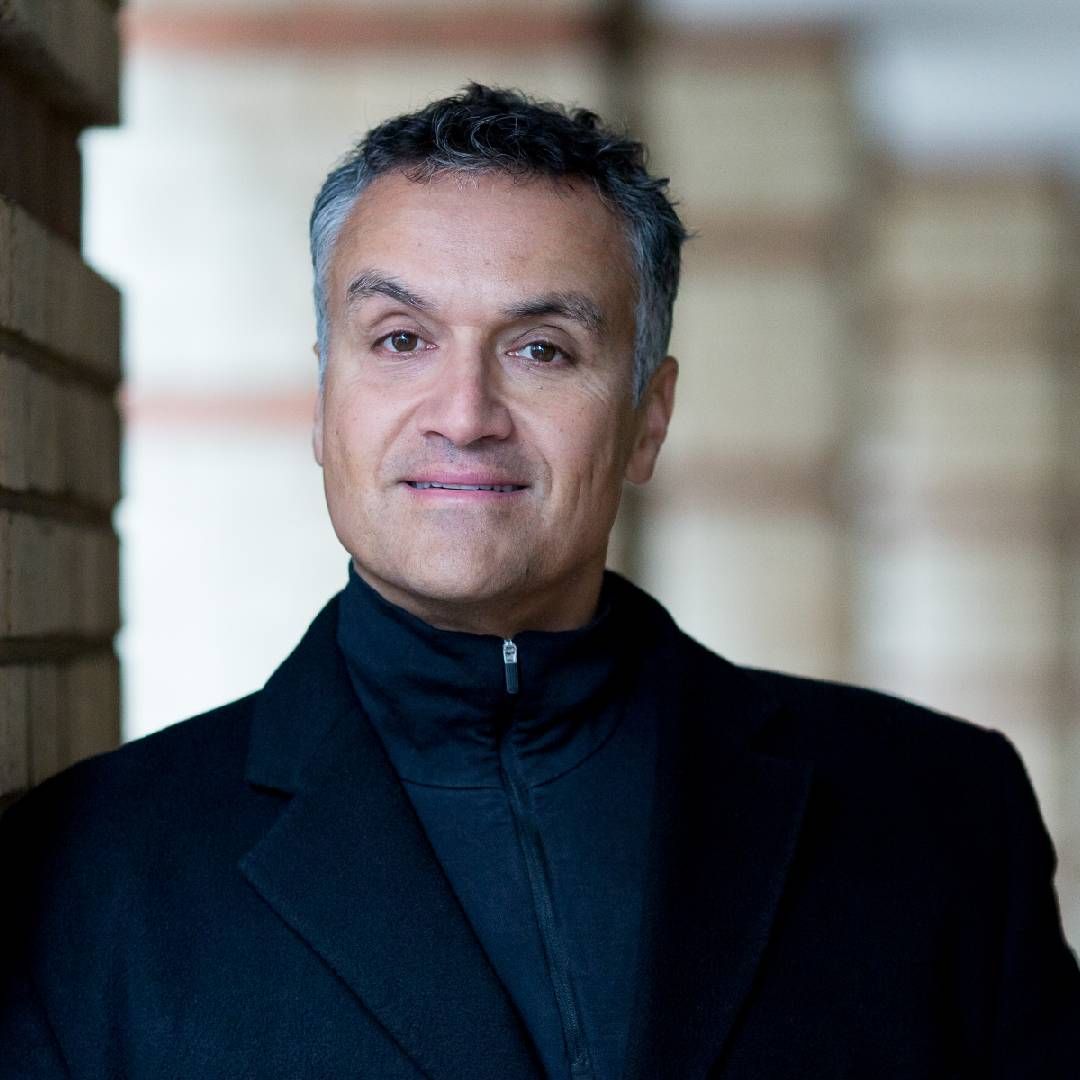Carl Honoré: We Can All Age Boldly
The international speaker, activist and author offers his perspective on the nuances of getting older and sees a positive shift in the conversation around aging
Most of us have likely experienced some version of an 'a-ha' moment about our age, but Carl Honoré has a rather unique story to tell about his: it occurred on a train, following a ball hockey game in London where he – the oldest member of his team – had scored the game-winning goal to advance them to the semifinals. More on that below.

A broadcaster, international speaker and writer, Honoré, 56, is the author of "In Praise of Slow" and "The Slow Fix" where he takes on what he calls "the cult of speed" society.
His most recent book, "Bolder: Making the Most of Our Longer Lives" focuses on a different kind of cult – what Honoré refers to as the "cult of youth." In a 2019 TED talk, Honoré breaks down the stereotypes on what it means to grow older in the world today: the myths that later life is depressing; creativity belongs to the young; older people are less productive and can't learn new things.
"Most aging stereotypes are flat-out wrong," he says to the audience. "Ageism is not invincible. The cult of youth is not a permanent or inevitable part of being human."
Next Avenue talked to Carl Honoré from his home in London about how the numbers in our age should never become a "straitjacket" and how he believes aging is a lot like a video game.
This interview has been edited for length and clarity.
An Unexpected Revelation About His Age
I played ball hockey (a game similar to ice hockey played on land) for the Great Britain National Masters team, the London Jets. We were at a national tournament, up in the north of England, and locked in a zero-zero tie in the quarterfinals with the team we had annihilated the year before. We just couldn't get the goal we needed and I could feel the nerves and the indignation coursing with my teammates. Then out of nowhere, I scored the goal that got us in the semifinals.
"Suddenly this thing that I had loved doing and was playing well, suddenly my age took on this terrible power to define and limit me."
It wasn't just any goal; it was one of those highlight reel/goal of the month type. I will be dining out on this goal for a very long time (laughs). I was floating on air, I felt like a superstar. One of the organizers sidled up to me and he said, 'Great goal. Congratulations. Semifinals.' But then he said, 'Guess what? I've been flicking through player profiles here, and it turns out that you're the oldest player at the tournament.' I knew I was one of the oldest but suddenly, to be the oldest, I don't know. It rocked me to my core. In the blink of an eye, I went from goal scorer to granddad.
All of these questions began crowding in. I was thinking, do I look out of place here? Are people laughing at me behind my back? Suddenly this thing that I had loved doing and was playing well, suddenly my age took on this terrible power to define and limit me. I came away from that tournament thinking, how can that be? This makes no sense. I scored this incredible goal. I'm having fun. Why should the numbers on my birth certificate become a straitjacket in this way?
Making Sense of a New Perspective
We were all on a train and we were in high spirits. But I remember at one moment just sitting, looking out the window by myself and thinking, wow. It was a real lightning bolt moment, and I knew I would come back to this topic. That was where "Bolder" came from.
"It's not like everything gets better as you get older, just as it's not as though everything gets worse as you get older."
For my own writing, I need to unwind some kind of philosophical dilemma or make sense of it … like doctor, heal thyself. I'm always trying to fix something in my own way of being in the world as well.
A Lens on the Cult of Youth
What I realized when I began picking this [issue] apart was that not only was I not alone in feeling hampered and hamstrung by my age, but that I myself was a card-carrying member of the cult of youth. I realized that I just either pushed away the idea of aging or found it vaguely abhorrent. It was something that I had put on a shelf.
This moment at the hockey tournament forced me to confront my own ageism, but also to anchor it in a bigger rethink about, how do I fit in? You realize you are not alone. So, the first thing I did was I began putting together a laundry list of all the things that I thought, or that we commonly think, are bad about aging.
The cult of youth view is that aging is a chamber of horrors. That after a certain age, it's all downhill, everything gets worse once you get past whatever, 30, 35, wherever we're drawing the line these days. Which of course is just patently untrue.
Taking a Nuanced Look at Aging
One of the most common stereotypes, of course, is that later life is depressing. You think of the words that we trot out, crotchety, grumpy, cranky, old. When in fact the U-shaped happiness curve tells a very different story.
Rather than this binary idea of you start here, you go down, or that somehow you go up, it is much more complex and nuanced than that. It's not like everything gets better as you get older, just as it's not as though everything gets worse as you get older. It's much more tangled and messier and interesting than that.
Aging as a Video Game
I think of aging now as a bit like a video game. I'm not a gamer myself, but I know that the way gamers think about the game is that you're at a level. So, I'm currently at level 56 (my age). The way you approach the game of life, the game in this metaphor, is I'm level 56, I'm going to make the most of level 56. I'm going to have all the adventures one can have at this level. I'm going to gather all the treasure, all the weapons, woo all the maidens, whatever it is. I'm going to get all that, and then I'm going to move up to level 57. What's waiting for me at level 57? It's something to look forward to. Now, occasionally I'll look back and think, man, I had a great time at level 29, but I don't want to go back to level 29. I'm at 56, I'm looking forward to 57. So, that's one of the ways I think about reframing aging.
"Now, occasionally I'll look back and think, man, I had a great time at level 29, but I don't want to go back to level 29. I'm at 56, I'm looking forward to 57."
Moving the Dial on Aging
I've been on the front lines of traveling around, talking, thinking, listening about aging for more than four years. ("Bolder" was released in 2019). I would say that the dial has made a quantitative leap in the last 10 months, the last year. With social media, the posts people are doing, the coverage in the press, the calling out of ageism in the workplace, companies taking steps forward to make their workforce friendly and welcoming to all ages. Recently several top CEOs in France signed a declaration with 10-step pledges to take down ageism. That would've been unthinkable two years ago, let alone 10. I think that we've made a great leap forward. There's a long, long way to go.
I was just in central London, standing on the platform at one of the tube stations. Right behind me, there was a massive poster saying, "Are you Ageist?" It's a big national campaign run by the Center for Ageing Better.
You certainly wouldn't have seen that when I brought "Bolder" out. I was having to explain to people what ageism was. Now it's a given. People know what it is. They're being asked to contemplate whether they're guilty of it. That's a big leap forward by any yardstick.
Ageism in the Working World
There's a feeling that the tectonic plates are shifting and the conversation is moving in a direction that's going to be better for everyone at every age. But there are still some dinosaurs in the way and there's a lot of inertia in the system. There are pinch points, and people feel that. I still meet a lot of people at events, or people write to me saying, 'Yeah. Totally get all this, it's important. I see changes coming, but I just had to pull the cord and get out and become an entrepreneur so I could create my own age-friendly space to build my own company without having to grapple with all these other hang-ups from people in the corporate world.'
What's Lost When Older Adults Leave the Workplace
I think institutional memory [is one loss]. There are two things here. One is general, whether you call it crystallized intelligence or wisdom. But also a certain kind of nuance and understanding how the world slots together, how the organization you work for fits into the bigger picture ... you lose that. That walks out the door when you freeze out a 54-year-old and make him or her feel unwelcome because they're the wrong side of 50.
There's also just the kind of institutional knowledge of the company that I think goes even deeper. I think that's why you're starting to see more and more companies devising schemes and programs to bring people back, and even to bring them back on looser terms. Maybe not on a full-time contract because that person who left probably doesn't want to come back full-time anyway. But once they come back in the door, they can just lay out a smorgasbord of all this experience and understanding that they've built up over the years that's just so potent and powerful for a company. You need that sweep, you need that scope, you need that diversity of lens.


